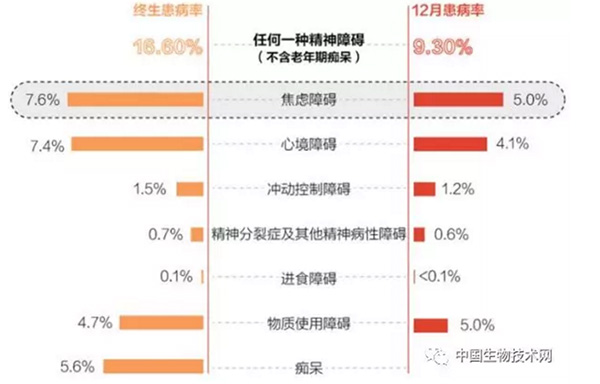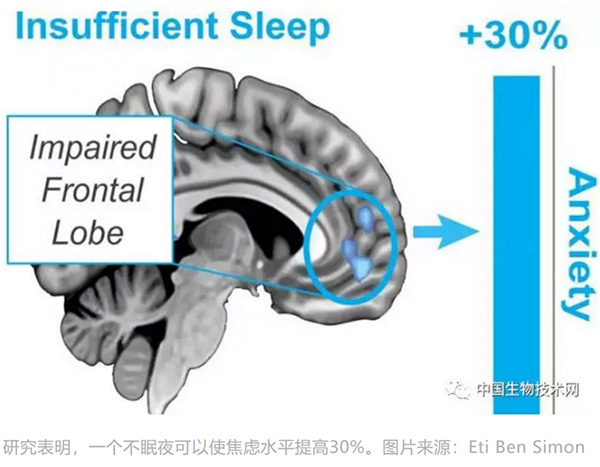China Biotechnology Network neuroscience on November 7, 2019

Do you feel anxious? Did you sleep well last night? When it comes to management anxiety, as Shakespeare's Macbeth said: sleep is "the comfort of the injured heart.". Beijing time on November 5, a new study published in nature human behavior shows that a night's sleep can stabilize mood, while a sleepless night may cause anxiety levels to rise by 30%. The study, led by Professor Matthew Walker of the University of California, Berkeley, provides one of the most powerful neural links between sleep and anxiety to date.

The researchers found that the type of sleep most likely to calm the anxious brain is deep sleep, also known as non rapid eye movement (NREM) slow wave sleep. In this state, the neural oscillations become highly synchronized and the heart rate and blood pressure drop. "We've discovered a new function of deep sleep that reduces anxiety overnight by reconfiguring brain connections," said Matthew Walker, a professor of neuroscience and psychology and co-author of the study. Deep sleep seems to be a natural anxiety inhibitor, as long as we can do it every night. "

The researchers also point out that sleep is a natural and non drug treatment for anxiety disorders. At the beginning of this year, the first national epidemiological survey of mental disorders in China, led by the Sixth Hospital of Peking University, published by the lancet psychiatry, showed that the prevalence rate of mental disorders (excluding Alzheimer's disease) was 9.32%, and the highest prevalence rate of anxiety disorder was 4.98%, The prevalence of anxiety disorder caused by many factors is on the rise, and more and more people are suffering from anxiety disorder.

"Our study strongly suggests that sleep deprivation can exacerbate anxiety," said ETI Ben Simon, lead author of the study and a postdoctoral researcher at the center for human sleep science. On the contrary, deep sleep can help relieve the stress. " In a series of experiments using functional magnetic resonance imaging (MRI) and polysomnography, the researchers scanned the brains of 18 young people. They watched exciting video clips after sleeping all night and after staying up all night. Anxiety levels were measured after each treatment with a questionnaire called state trait anxiety scale. After a sleepless night, brain scans showed that the medial prefrontal cortex was closed. This usually helps to control our anxiety, and the deeper emotional centers of the brain are hyperactive.

"If you don't sleep, it's like the emotional accelerator of the brain is too much on and there's not enough braking," Walker said The researchers measured their brain waves with electrodes placed on their heads and found that their anxiety levels dropped significantly, especially for those who experienced NREM slow wave sleep. "Deep sleep has restored the prefrontal regulation mechanism of the brain, which regulates our emotions, reduces our emotional and physiological response, and prevents the escalation of anxiety," Simon said In addition to measuring the sleep anxiety relationship of 18 original participants, the researchers replicated this result in another 30 participants. Again, of all participants, those who slept more at night had the lowest levels of anxiety the next day. In addition to laboratory experiments, the researchers conducted an online study. They tracked sleep and anxiety levels of 280 people of different ages over four consecutive days. The results showed that participants' sleep time and quality from the first night to the second night could predict their anxiety level the next day. Even subtle changes in night sleep can affect their anxiety levels. "People with anxiety often report disturbed sleep, but sleep improvement is rarely considered a clinical recommendation to reduce anxiety," Simon said. Our research has not only determined the causal relationship between sleep and anxiety, but also determined what kind of deep non REM sleep we need to soothe the hyperanxiety brain "At the social level, the decrease in sleep time and the significant increase in anxiety in most industrialized countries may not be coincidental, but causal," Walker said. The best bridge between despair and hope is a good sleep
